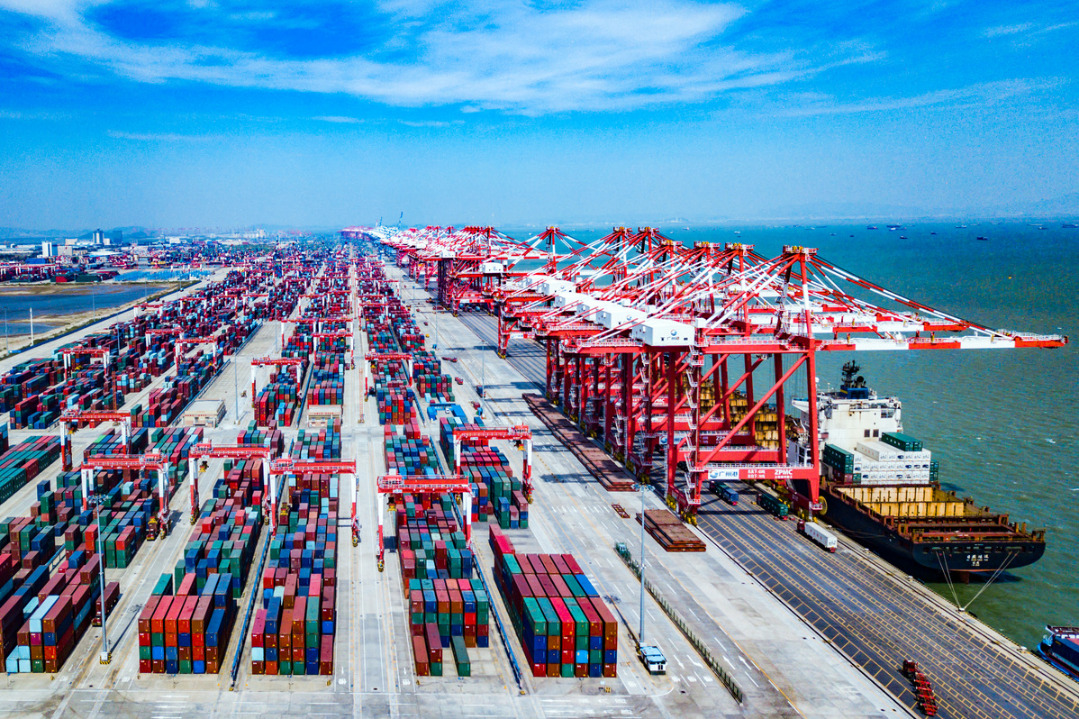Build resilience to cope with emergencies


The devastating floods in Henan province have claimed hundreds of lives and destroyed billions of dollars worth of property. Zhengzhou, the provincial capital with a population of about 12 million, has been the worst hit. It received a record 201.9 millimeters of rainfall in just one hour last month.
On July 20, almost the same time as Zhengzhou deluge, the first case of the Delta variant was confirmed at Nanjing Lukou International Airport. By the end of last month, almost 300 cases had been reported in China.
Until recently, China's economic recovery has been spectacular. Could extreme weather events and novel coronavirus variants undermine it?
On Tuesday, more than 300 people were confirmed to have died in the Henan floods with 50 still missing. While resident evacuations peaked at 1.5 million, 934,000 people have been relocated and some 10 million affected.
On Monday, the State Council, China's Cabinet, formed a task force to comprehensively investigate whether there have been any lapses or shortcomings in the response to the natural disaster. The results will be vital for Zhengzhou and Henan, but also for other Chinese cities and provinces that could face extreme weather events in the future.
What amplifies the economic impact of the deluge is the role of Zhengzhou as a major junction on north-south and east-west high-speed train lines, with connections to most major Chinese cities. In addition to heavy casualties, property losses are high, due to the floods is high. According to current estimates, direct economic losses amount to about $18 billion.
Power plants were coping with peak summer demand before the Henan floods. After flooding, the transport of coal to central and eastern China could be significantly impacted. Floods tend to have a longer-term impact on farm output.
The disruptions will be in the short term, however. The longer-term impact of the floods on global supply chains is likely to be negligible for goods, ranging from cars and electronics to coal, pigs and peanuts.
The Chinese authorities, according to reports, have contained more than 30 outbreaks, from Guangdong province to Liaoning province. But the cause of the latest outbreak is the highly contagious and transmissible Delta variant.
After more than a dozen cleaners tested positive for the novel coronavirus at the Nanjing international airport, over 20 cities have identified linked cases. Media reports suggest the virus spread due to lax management and poor pandemic-prevention and control measures at the airport.
Three factors contributed to the spread this time: the highly infectious and transmissible character of the Delta variant, the timing of the outbreak — peak tourist season — and a busy international passenger hub.
The number of confirmed global cases is more than 200 million, while deaths have soared to 4.23 million. Yet by the end of April, the Delta variant accounted for less than 5 percent of all cases worldwide. Alarmingly, however, that figure has increased to 75 percent of the total.
The spread of the Delta variant notwithstanding, the economic impact is likely to be marginal as long as the authorities impose strict prevention and control measures, including testing, contact tracing and quarantine, and ensuring people continue to wear face masks and maintain social distancing. Also, the pace of vaccinations should be further intensified. Intra-provincial trips should be delayed or canceled, particularly to and from medium- to high-risk provinces. But for this plan to be successful, cooperation of the people is mandatory.
Although the number of Delta variant cases in China is very low compared with the United States and some European countries, preemptive measures are needed to lessen its economic impact, because the greater the demand-side liabilities, the greater the supply-side damage.
The earliest the Delta can be contained, the likelier it will be to limit the impact to the region, which can be offset it in the coming months.
In the first quarter of 2021, the Chinese economy grew by 18.3 percent, mainly due to the low base from last year. After the economic contraction in the first quarter of 2020, retail sales, industry value added investment, real estate and trade operations have increased prominently this year.
Overall, China's economic performance has been strong despite the government reducing budget deficit, restraining new local government special bond issues, and tightening measures in the real estate sector. Policymakers are also likely to increase liquidity to prevent excessive tightening of monetary conditions
Thanks to the spectacular recovery, China's GDP growth before the Henan deluge and Delta variant outbreak was forecast at 7.5-8.0 percent in 2021 and 5.5 percent in 2022.
But will the natural disaster and new outbreak affect China's macroeconomic performance?
It would not be surprising if factory activity expands at a slightly slower pace, primarily due to higher raw material prices owing to the floods, government policies and rising COVID-19 cases, which in turn could slightly slow China's full economic recovery. But the effect could be largely marginal if the country doesn't encounter any more large-scale natural disasters and contains the new infections.
Climate change is accelerating the frequency of severe storms, floods, droughts and extreme heat events. Extreme weather events are now part of the new global landscape. In the long run, the only viable way to cope with such challenges is rapid acceleration of resilience and sustainability.
The author is the founder of Difference Group, and has served at the India, China and America Institute (USA), Shanghai Institutes for International Studies (China) and the EU Centre (Singapore).
The views don't necessarily reflect those of China Daily.
If you have a specific expertise, or would like to share your thought about our stories, then send us your writings at opinion@chinadaily.com.cn, and comment@chinadaily.com.cn.


































